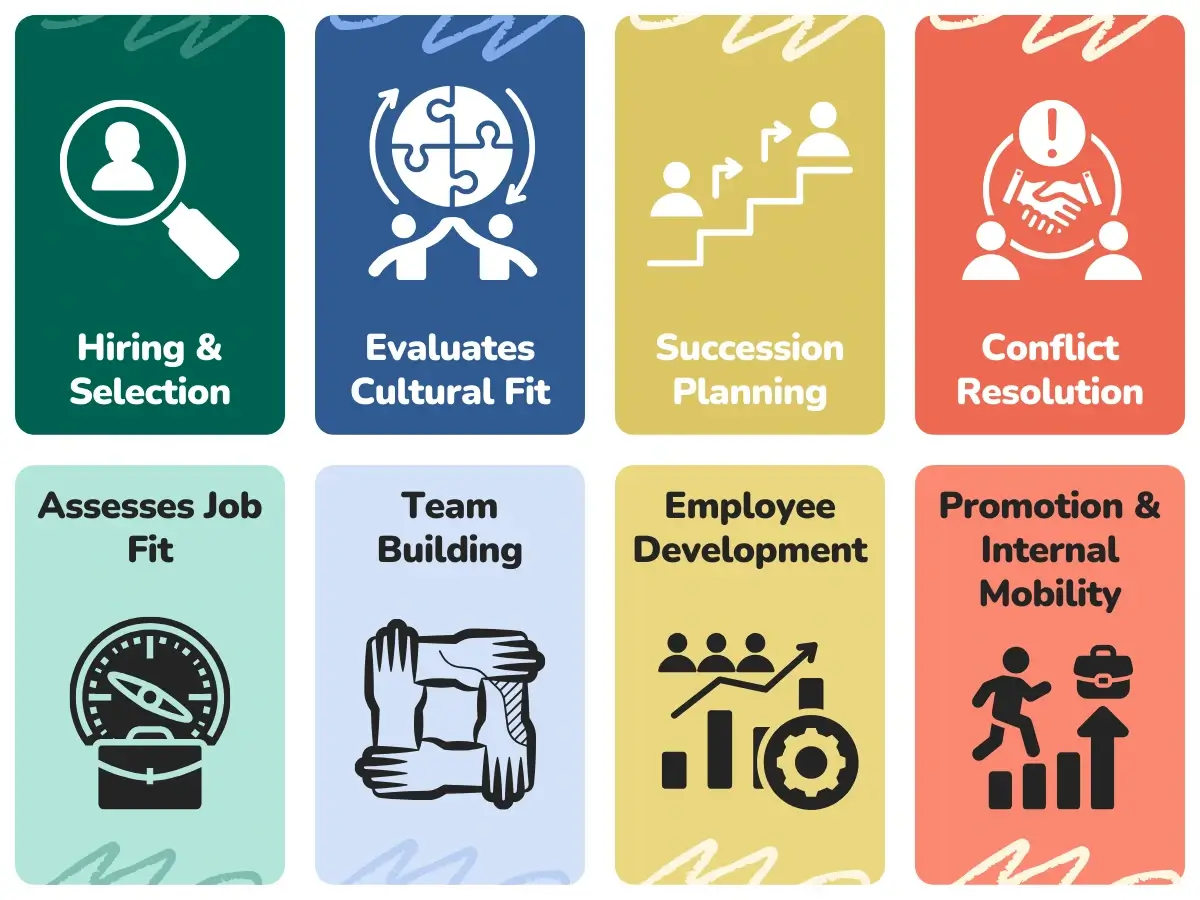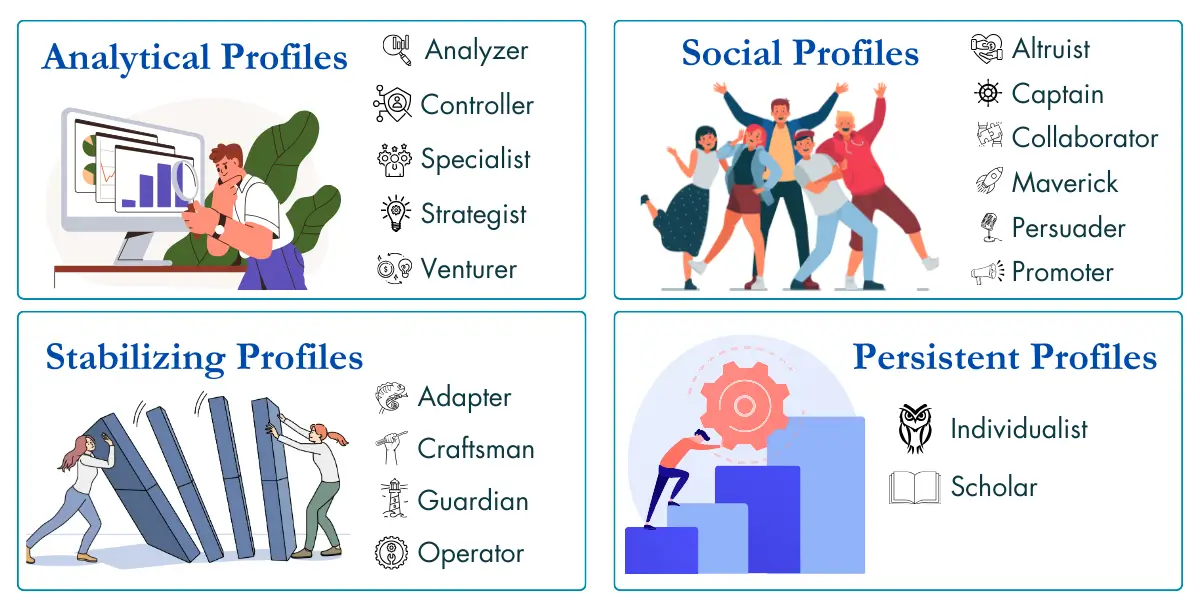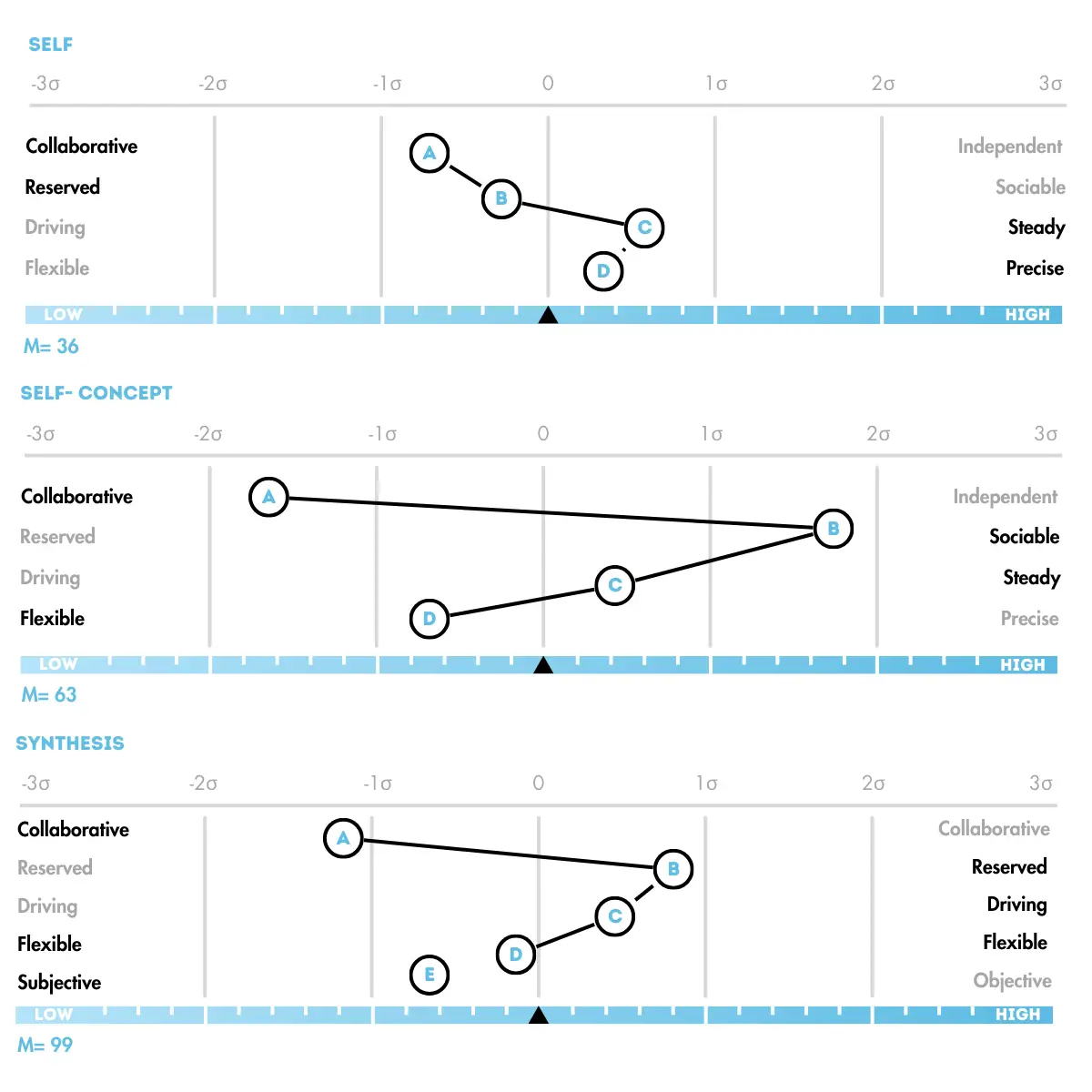Predictive Index Behavioral Assessment Study Guide: 2025 Update
- Overview
- Question Format
- Curriculum
- Reviews
In the current employment landscape, companies are increasingly utilizing a range of evaluation methods to find the best fit for their organization. One of the assessments that is used for screening candidates is the Predictive Index, a tool that assesses both cognitive and behavioral aspects to determine the best job fit.
PIBA, or Predictive Index Behavioral Assessment is an important component of the Predictive Index suite of assessments. Our comprehensive course focuses on PIBA, offering insights into its purpose, the facets it evaluates, and the scoring methodology it employs. Whether you are a job seeker looking to excel in PIBA or an HR professional aiming to master candidate evaluation, our course is tailored to your needs. Join us on this educational journey to gain the skills and knowledge necessary to succeed in PIBA.
Let’s begin by understanding what PIBA is and what it incorporates.

Predictive Index Behavioral Mastery
Last Updated: Jan 24, 2025
Course Content
-
 Introduction 2 Step - 5 MinutesBuy this Course: Get full access to all lessons, practice tests and guides.
Introduction 2 Step - 5 MinutesBuy this Course: Get full access to all lessons, practice tests and guides. -
 Exploring Behavioral Drives 1 Step - 1 Hours & 10 MinutesBuy this Course: Get full access to all lessons, practice tests and guides.
Exploring Behavioral Drives 1 Step - 1 Hours & 10 MinutesBuy this Course: Get full access to all lessons, practice tests and guides. -
 Behavioral Assessment Details 1 Step - 1 Hours & 10 MinutesBuy this Course: Get full access to all lessons, practice tests and guides.
Behavioral Assessment Details 1 Step - 1 Hours & 10 MinutesBuy this Course: Get full access to all lessons, practice tests and guides. -
 Understanding Reference Profiles 4 Steps - 3 Hours & 20 MinutesBuy this Course: Get full access to all lessons, practice tests and guides.
Understanding Reference Profiles 4 Steps - 3 Hours & 20 MinutesBuy this Course: Get full access to all lessons, practice tests and guides. -
 Reporting in Predictive Index 1 Step - 45 MinutesBuy this Course: Get full access to all lessons, practice tests and guides.
Reporting in Predictive Index 1 Step - 45 MinutesBuy this Course: Get full access to all lessons, practice tests and guides. -
 PIBA - Role Specific Practice Quiz 4 Steps - UntimedBuy this Course: Get full access to all lessons, practice tests and guides.
PIBA - Role Specific Practice Quiz 4 Steps - UntimedBuy this Course: Get full access to all lessons, practice tests and guides.
What is Predictive Index Behavioral Assessment?
PIBA, the Predictive Index Behavioral Assessment, is a tool for assessing work-related personality traits. Rooted in workplace behavior theories, it helps recruiters anticipate behavior. It focuses on cultural fit and identifying ideal roles based on individual needs and personality, not as a pass/fail test.
The late Arnold S. Daniels developed this test to make hiring easier, but over the time it has been used and helped in various purposes. Let’s take a look at the different things this test helps with:

What is Evaluated in PIBA?
PIBA essentially evaluates a person’s behavioral drive in the context of his workplace. A behavioral drive can be understood as a basic need or external factor that makes people act or behave in a certain way while doing their job. This drive may originate from internal motivations, (wanting more money) or external influences (deadlines).
PIBA follows a framework of assessing 4 core behavioral drives and 1 secondary behavioral drive that predominantly influence a person’s behavior in the workplace. These Drives are:
- Dominance: This is the drive to exert influence on people and events. High scorers in this dimension are independent, self-confident, and assertive, while those who score low in this dimension are agreeable, accommodating, and cooperative.
- Extraversion: This is the drive for social interaction with other people. Those who score high in this dimension are persuasive, outgoing, and socially affluent, while those who score low are serious, task-oriented, and introspective.
- Patience: This is the drive to have consistency and stability. Those who score high in this dimension are consistent, deliberate, and patient, while low-scorers are intense, fast-paced, and urgent.
- Formality: This is the drive to conform to rules and structure. High-scorers in this dimension are self-disciplined, organized, and precise, while those who score low are uninhibited, informal, and casual.
- Objectivity: This is the secondary drive that assesses a person’s decision-making style in the context of the 4 primary factors.
Join our course to explore these drives in detail and see how they affect behavior in the workplace environment of the person.
Ready to Transform Your Future?
Join our course to explore Predictive Index Behavioral Assessment in detail and see how it assesses behavior in the workplace environment.
🔴 Enroll Now to embark on your journey to success! 🔴
Question Format
This test is designed to explore how a person would behave in the workplace and whether they are the right fit for the job role defined.
Key Features of the test
| Time | Untimed test, but takes approximately 6 minutes to complete |
| Format | Free-choice, Stimulus-response test |
| Assessment Targets | 4 Core Drives: Dominance, Extraversion, Patience, Formality ; 1 Secondary factor: Objectivity |
What is included in the test?
The candidate is presented with two identical lists containing 86 adjectives that are related to the 5 behavioral drives: Dominance, Extraversion, Patience, Formality, and Objectivity (also referred to as A, B, C, D, and E Drives respectively).
- Self-Concept List: Candidates are instructed to select the adjectives that they believe describe the way they are expected to behave by others.
- Self List: Candidates are instructed to select adjectives that they believe describe them.
Here are some example words you might see on the test:
(For illustrative purposes only)
| Daring | Tolerant | Pragmatic | Audacious |
| Sentimental | Amiable | Disciplined | Unassuming |
| Unobtrusive | Dispassionate | Selfish | Enduring |
| Thoughtful | Resilient | Consistent | Obstinate |
| Expressive | Protocol-driven | Polished | Objective |
Unlike Predictive Index Cognitive Assessment, there is no, ‘correct’ answer. The ‘right‘ response varies based on the job position applied for. Different roles demand different traits thus, the PI Behavioral Assessment offers employers a detailed breakdown of how well candidates align with the specific traits required for a particular job.
For instance, in a project manager role, desirable traits include dominance, patience, and formality. Therefore, selecting words like tolerant, disciplined, protocol-driven, thoughtful, and consistent from the provided list would reflect positively. However, for a sales executive position, more ideal choices might be present.
What is the Ideal Number of Adjectives to Choose?
There is no limit to how many adjectives a candidate can select, however, a suitable range is recommended.
The number of adjectives that the candidates select is denoted as M score. Although this may not directly influence outcomes, an excess or shortage of adjectives can compromise the statistical integrity of the test. Candidates should aim for a moderate selection of adjectives from the lists provided to ensure that the reports received by employers do not contain extreme scores. Extreme scores (selecting less than 6 or more than 80) might lead to questioning the integrity of the test taker. The recommended range is between 20 and 50 adjectives.
A trait will only be seen as a characteristic of the candidate if they select enough adjectives that belong to the trait. For example, if an applicant selects words like persuasive, talkative, open, and tolerant- they all correlate with the trait of extroversion, which is a desired quality for many job roles.
Should a Candidate Choose Different Adjectives From the Two Lists?
Generally, marking different adjectives on each list is not problematic. Discrepancies between the two lists are common and can align with specific job requirements.
Nevertheless, consider the following points:
- If extreme differences are found between the two lists, it will catch the attention of the employers. In cases where the two lists reveal entirely different personas, the employer might decide not to select that candidate, or further analyze the work required to manage that discrepancy.
- If the applicant is seeking a similar job to their present role, extreme differences may show the employer that they are not a good fit for the job. Such disparities imply a mismatch between the candidate’s current duties and the new job’s demands. A substantial gap could lead to repercussions, potentially resulting in the employer choosing another candidate.
In essence, balance is key. Applicants should aim to avoid extremes in their adjective selections across both lists.
Predictive Index Behavioral Assessment Reference Profiles
After completing the Predictive Index assessment, the candidate is assigned a “Reference Profile” based on the selected adjectives, which fall into one of 17 categories identified by PIBA. Reference Profiles can be understood as behavioral maps, each reflecting distinct working styles and motivations.
These profiles offer insights into your primary traits, enhancing team dynamics and collaborative skills—valuable assets for addressing workplace challenges.
The 17 reference profiles are categorized into 4 broad categories. Let’s take a look:

Analytical Profiles
Within the analytical group, the reference profiles exhibit dominance over extraversion and operate at a brisk pace. They typically prioritize tasks over interpersonal relationships.
Social Profiles
The reference profiles within the social group display a pronounced extraverted nature compared to other behavioral tendencies. These individuals in the workplace often prioritize building and maintaining relationships.
Stabilizing Profiles
The reference profiles within the stabilizing group are characterized by steadiness, attention to detail, and proficiency in working within structured environments and processes.
Persistent Profiles
Individuals with profiles in the persistent group tend to be task-oriented and purposeful in the workplace. They excel when given autonomy over their work and operate with a deliberate approach.
Each of these profiles contains a distinct signature working style and characteristics that give insights to the employer about the work preferences, style, and behavior the candidate has.
Predictive Index Behavioral Assessment Reports & Results
The scores are translated into distinctive behavioral patterns, which are represented as graphs in the reports that both candidates and recruiters receive. These reports include graphical representations of self, self-concept, and synthesis (combining self and self-concept), offering ratings on four scales:
- Collaborative – Independent
- Reserved – Sociable
- Driving – Steady
- Flexible – Precise
The Synthesis scale introduces an additional dimension:
- Subjective – Objective

These reports offer a wealth of information to both candidates and recruiters, aiding in the understanding of their assessment results.
Because this test doesn’t have one ‘correct‘ answer, the key to doing well in this assessment is identifying the needs of the prospective employer and using that information to showcase those qualities through answer choices in the assessment. Intentional forced selection or outright lying in the assessment is not recommended. Candidates should focus on preparation & research, to help them best showcase their suitability for the role.
Why Choose Our PIBA Prep Course?
Qualified candidates often struggle with the Predictive Index test due to its format and questions. At Prepterminal, we help you boost your confidence and demonstrate your job suitability. Take a look at the features that make our course the best choice for navigating the nuances of PIBA:
- Simplified Learning: We have structured the content into lessons that are clear and easy to understand, making the content more approachable and less intimidating.
- Comprehensive Prep Guide: Our course includes dedicated lessons that cover all aspects of the Predictive Index Behavioral Assessment. We provide thorough information on topics such as behavioral drives, reference profiles, and reports generated, ensuring you gain a comprehensive understanding of this assessment.
- Confidence Through Practice: After the lessons, we provide practice sets for the covered topics. This means you won’t just learn the material; you will get to apply it, reinforcing your understanding and building confidence.
- Flexibility: Study at your own pace with 24/7 access to course materials.
Ready to Transform Your Future?
Join our course to explore Predictive Index Behavioral Assessment in detail and see how it assesses behavior in the workplace environment.
🔴 Enroll Now to embark on your journey to success! 🔴
Frequently Asked Questions (FAQs)
When choosing adjectives, consider how they reflect your self-perception and their relevance to the job you are applying for. Extreme differences between your selections could prompt questions from employers about the consistency of your profile.
Avoid extreme differences in the adjectives chosen from both lists. Strive for coherence in your selections to present a consistent and favorable impression to prospective employers.
Your PI score and results are determined by several factors:
- The relevance of each adjective to specific factors and the number of adjectives chosen from each category.
- Alignment of your results with the qualities required for the role.
- The total number of words you select.
- The ratio of words chosen from each list.
- The number of words selected to represent each factor.
There’s no single best way to pick words that describe you. The key is to carefully choose words that are important for the job and to use a mix of them to show all your good points. Try to understand what qualities the job values and pick words that show you have those qualities.
Companies turn to the Predictive Index Behavioral Assessment to do more than just review a candidate’s resume, which usually only shows their qualifications. This tool helps them see if a candidate’s personality and work style are a good fit for the job and the company culture. It’s all about finding the right person for the job from the start, which saves the company from wasting time and money on the wrong hire. The PI isn’t just for hiring new people; it’s also used when deciding which current employees are ready to move up in the company.

Created by: Tanoo Purohit
MSc - Clinical Psychology, Psychometric Tutor, Prepterminal Test Expert
349 students, 4.7, 66 Reviews
I’m Tanoo Purohit, with a BA honors and an MSc in Clinical Psychology from the renowned National Forensic Sciences University. Over seven years, I’ve studied the intricacies of the human psyche (as a part of my curriculum and practice). Proudly associated with PrepTerminal, I serve as a Psychometric Course Author and am recognized as a Psychological Test Expert. In every course I craft, I merge my expansive knowledge with relatable insights, ensuring that complex psychological concepts are presented with clarity and resonance for all learners. Feel free to contact me at [email protected].
